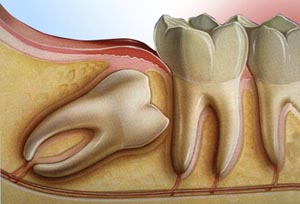|
|
||||
|
When to Remove Wisdom Teeth?People between the ages of 16 and 19 should have their wisdom teeth evaluated. If they need to be removed, it should be considered before age 20 when generally fewer complications occur. At a younger age, tooth roots are not fully developed, the surrounding bone is softer, and there is less chance of damaging nearby nerves or other structures. There is also less surgical risk and healing is generally faster. Extractions of wisdom teeth may be performed by a general dentist. If your dentist anticipates any special care will be needed, he or she may refer you to an oral or maxillofacial surgeon. An oral or maxillofacial surgeon is a dentist who specializes in surgery and the removal of wisdom teeth. |
What to Expect?Before surgery, your dentist will explain what to expect, have you sign a consent form and give you personalized instructions to follow. Keep in mind these general items in order to help your surgery go smoothly. Wear loose, comfortable clothing and arrange to have someone be with you after surgery. Extraction can be performed under local conscious sedation or general anesthesia. Following surgery, you may experience some swelling and mild discomfort, which is part of the normal healing process. Cold compresses can help decrease the swelling and medication prescribed by your dentist can help decrease the pain. You may be instructed to drink only clear liquids following surgery and later progress to soft foods. Some patients experience numbness or tingling following surgery. Normal sensation usually returns in a short period of time. Occasionally, a dry socket occurs when the blood clot breaks down earlier than normal. A dressing placed in the socket protects it until the socket heals. Talk with your dentist about any questions that you have. It is especially important to let your dentist know, before surgery, of any illness that you have and medications that you are taking. If your general dentist has referred you to a specialist, they will both work together to provide you with the best and most efficient care. Keeping your teeth healthy – to a wise old age – is your dentist’s primary concern. |
Aftercare
- Clear liquids, not hot, must be used in the diet for the first day - Soft foods can be consumed as tolerated - Brush all but the surgical site the first day, then all areas thereafter - Brush your tongue - Avoid rinsing and spitting the first day after surgery - Follow all special instructions given by your dentist |
 Wisdom teeth only partially erupt. This leaves an opening for bacteria to enter around the tooth and cause an infection. Pain, swelling, jaw stiffness, and general illness can result.
Wisdom teeth only partially erupt. This leaves an opening for bacteria to enter around the tooth and cause an infection. Pain, swelling, jaw stiffness, and general illness can result. Impacted wisdom teeth may continue growing without enough room, damaging adjacent teeth.
Impacted wisdom teeth may continue growing without enough room, damaging adjacent teeth. - Keep gauze in place, as instructed by your dentist
- Keep gauze in place, as instructed by your dentist